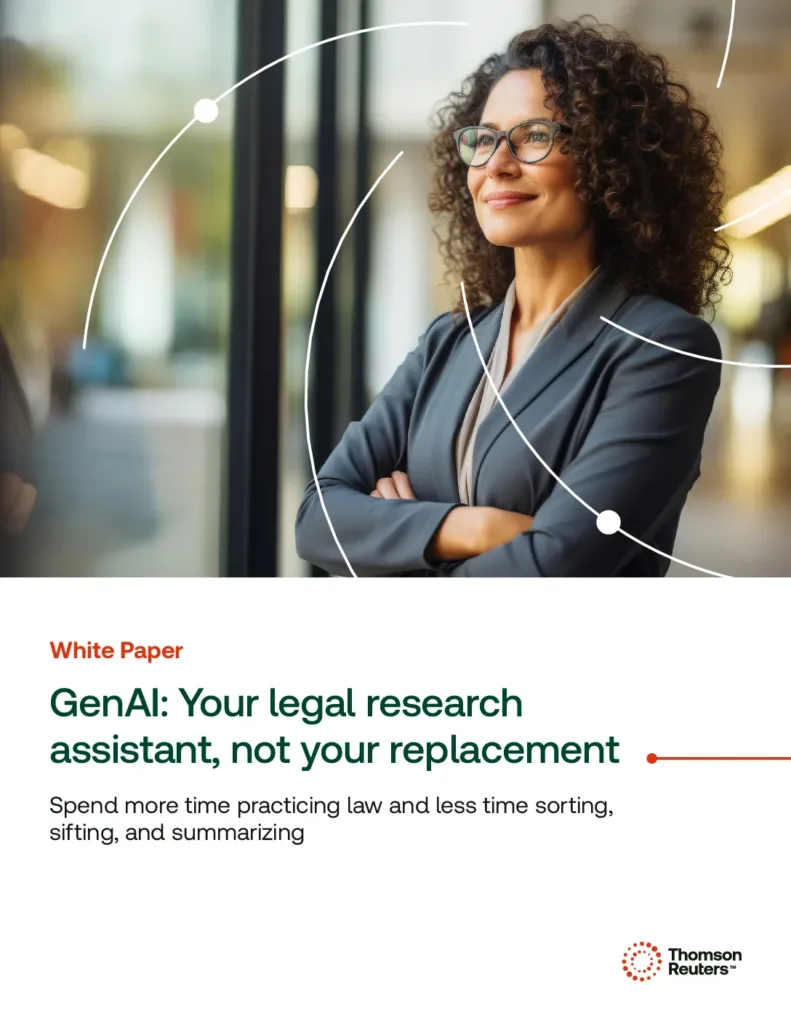Based on the Thomson Reuters Institute's "Future of Professionals" report
The legal industry stands on the brink of a transformative era, driven by the rapid advancements in Generative AI (GenAI). The Thomson Reuters Institute’s “Future of Professionals Report” offers a compelling vision of how GenAI will reshape the landscape for legal professionals.
As law-firm leaders, it is imperative to understand these changes and proactively prepare to harness the full potential of GenAI. This blog explores the key insights from the report and provides actionable strategies for law firms to navigate this transition effectively.
Jump to ↓
| Understanding GenAI |
| Key insights from the report |
| Preparing for the GenAI transition |
| Strategic recommendations for law firms |
| Embracing the GenAI revolution: A call to action for law firms |

White paper
The future of the law firm: No time for bystanders amid AI’s increasing influence
Access white paper ↗Understanding GenAI
Generative AI, or GenAI, refers to a subset of artificial intelligence that can generate new content, including text, images, and even complex legal documents, based on the data it has been trained on. Unlike traditional AI, which follows predefined rules, GenAI can learn patterns and create novel outputs, making it highly adaptable and powerful. In the legal field, GenAI is already being used for various tasks such as drafting contracts, conducting legal research, and automating routine administrative functions.
Key insights from the report
The “Future of Professionals Report” highlights several critical impacts of GenAI on the legal industry:
- Impact on legal workflows and efficiency: GenAI has the potential to significantly streamline legal workflows, reducing the time spent on routine tasks and allowing legal professionals to focus on more complex and strategic activities. This increased efficiency can lead to cost savings and improved client satisfaction.
- Changes in client expectations and service delivery: As clients become more aware of the capabilities of GenAI, their expectations for faster, more accurate, and cost-effective legal services will rise. Law firms must adapt to these changing expectations by integrating GenAI into their service delivery models.
- Ethical considerations and compliance: The use of GenAI in legal practice raises important ethical questions, particularly around issues of bias, transparency, and accountability. Law firms must ensure that their use of GenAI complies with ethical standards and regulatory requirements.
Preparing for the GenAI transition
To successfully navigate the GenAI transition, law firms must take proactive steps in several key areas:
- Investing in technology and infrastructure: Law firms need to invest in the necessary technology and infrastructure to support GenAI applications. This includes upgrading IT systems, ensuring robust data management practices, and adopting cloud-based solutions for scalability and flexibility.
- Upskilling and reskilling legal professionals: The adoption of GenAI will require legal professionals to develop new skills and competencies. Law firms should invest in training programs to upskill their workforce in areas such as data analysis, AI ethics, and technology management.
- Fostering a culture of innovation: Embracing GenAI requires a cultural shift within law firms. Leaders must foster a culture of innovation by encouraging experimentation, supporting cross-functional collaboration, and rewarding creative problem-solving.

White Paper
Spend more time practicing law and less time sorting, sifting, and summarizing with the power of generative artificial intelligence (GenAI).
Access white paper ↗Strategic recommendations for law firms
Based on the insights from the report, here are some strategic recommendations for law firms to prepare for the GenAI transition:
- Developing a GenAI roadmap: Law firms should create a comprehensive GenAI roadmap that outlines their strategic vision, goals, and implementation plan. This roadmap should include short-term and long-term objectives, as well as key milestones and performance metrics.
- Enhancing data security and privacy measures: As GenAI relies heavily on data, law firms must prioritize data security and privacy. This includes implementing robust cybersecurity measures, conducting regular audits, and ensuring compliance with data protection regulations.
- Collaborating with tech partners and vendors: Law firms should seek partnerships with technology providers and vendors who specialize in GenAI solutions. These collaborations can provide access to cutting-edge technologies, expert knowledge, and valuable resources.
Embracing the GenAI revolution: A call to action for law firms
The GenAI revolution presents both challenges and opportunities for the legal industry. By understanding the key insights from the Thomson Reuters Institute’s “Future of Professionals Report” and taking proactive steps to prepare, law firms can position themselves for success in this new era. Embracing GenAI is not just about adopting new technology; it is about reimagining the way legal services are delivered and creating a future-ready firm. Law-firm leaders must act now to lead their organizations through this transformative journey and unlock the full potential of GenAI.
As we stand at the cusp of this technological revolution, the call to action is clear: embrace the change, invest in your people and infrastructure, and cultivate a culture of innovation. The future of the legal profession is being written today—ensure your firm is ready to lead the way.

CoCounsel Legal
AI lawyers swear by: Trusted content, expert insights, and an all-in-one solution with ISO/IEC 42001:2023 certification
See it in action ↗











